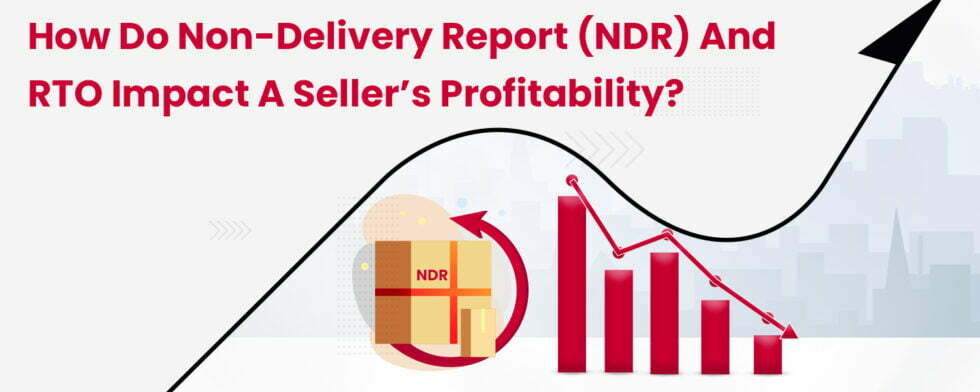NDR (Non-Delivery-Report) and RTO (Return-to-Origin) are two words that any eCommerce firm in India would come across regularly. Therefore, it is critical to understand what each of these abbreviations stands for in further detail. Starting with NDR, it is an abbreviation for Non-Delivery Report. Non-delivery of orders is one of the major order fulfilment interruptions an eCommerce business may have to face. Failed deliveries are the ones that are not delivered successfully to the end customer in the first go.
Failed order deliveries are reported to eCommerce businesses as NDRs (non-delivery reports). Ultimately, a non-delivery report on the NDR panel helps in delivering the order to the end customer. Let us now have a look at RTO. It is an acronym for Return to Origin in Logistics. Orders that are not deliverable and should now be returned to the origin warehouse are referred to as “out-of-stock orders.” They may be renovated, refilled, and resold once they reach their destination if they survive the voyage.
Unfortunately, RTOs cause significant losses for your online business since the money paid by the client is reimbursed even while the shipping expenses incurred against you are not credited. While RTO and NDR are two distinct entities in the logistics business, they are connected.
How Does a Non-delivery Report Become an RTO?
If a delivery agent cannot deliver an order to a client on the first attempt, a non-delivery report is created for it in the NDR panel. When this occurs, the carrier arranges for a second delivery attempt, which generally a different delivery agent does. When it comes to delivery reattempts, most carriers restrict the amount to three. But what happens to an order after three failed delivery efforts (i.e., three times it has been recorded as an NDR)? Unfortunately, the order is immediately tagged as Return-to-Origin in logistics, resulting in a loss of revenue. As a result, there are financial losses and a negative impact on the customer experience. The management of non-disclosure agreements forms a significant element of this work since most major organisations regard maintaining RTOs as an inevitable duty. Therefore, NDRs are a significant contributor to the sellers’ high RTO percentage.
What is the Impact of NDR and RTO on the Profitability of Online Sellers?
Hopefully, we have provided you with a general understanding of how NDR and RTO function in the eCommerce industry. However, to obtain a thorough understanding of each function, we felt it would be beneficial to break down its negative impact on an online retail business. In the long term, the side effects of RTO and NDR can be very detrimental to the development and profitability of any company. The following are the most significant immediate consequences of NDR and RTO and a quick explanation of how they reduce profitability.
1. Delivery has been Postponed
Customers are constantly on edge until their order is delivered to them. When an NDR happens, it is always seen as a further delay in completing the delivery process. Customers may get more apprehensive as a result, increasing their likelihood of cancelling their transaction.
2. Unsatisfactory Customer Service
When you think that high levels of anxiety were enough to make customers detest the delivery process, sluggish responses to NDR might result in the order not being delivered at all. Customers will continually link the delivery failure with your brand identity, causing you to lose business and reputation.
3. Shipping Fees that are Not Necessary
You do not want your company to suffer any unwarranted financial losses. Unfortunately, you are still responsible for the forward shipping expenses if a return-to-origin in logistics happens, although you have lost a customer. In addition, there may be additional fees related to the return travel that are not disclosed.
4. Loss of Product is a Possibility
As for returning home, it should be noted that it is a lengthy and hard journey that will take several days. The best reverse logistics services are not always provided by all airlines. It indicates a significant likelihood of your goods becoming misplaced, damaged, or stalled somewhere on their journey back from the manufacturer. As a result, the already high toll for RTOs is pushed even farther up the scale.
5. Cancellations Regularly
We have already indicated that cancellations might occur as a result of delays. Failed deliveries, poor delivery experiences, and even longer delays can result in customers cancelling the orders. An NDR that has been transformed into an RTO is bad enough, but the cancellations that occur due to an unmanaged NDR are extremely troublesome.
Conclusion
Both NDR and RTO are detrimental to a company’s operations. Hopefully, at this time, it has become obvious what the situation is. However, you are not obliged to accept the situation. Your ability to lead the path for growth and address the challenges and pains that afflict so many others in the sector comes from your position as an eCommerce firm in India. And although neither is preventable, there is a lot you can do not just to reduce the harm caused by each but also to convert them into opportunities if you are proactive. All that is required of you is to keep yourself updated about company trends and utilise the appropriate resources. NDR management software may go a long way toward ensuring that most NDR is added to order fulfilment figures rather than the return to origin in logistics numbers in your system.




